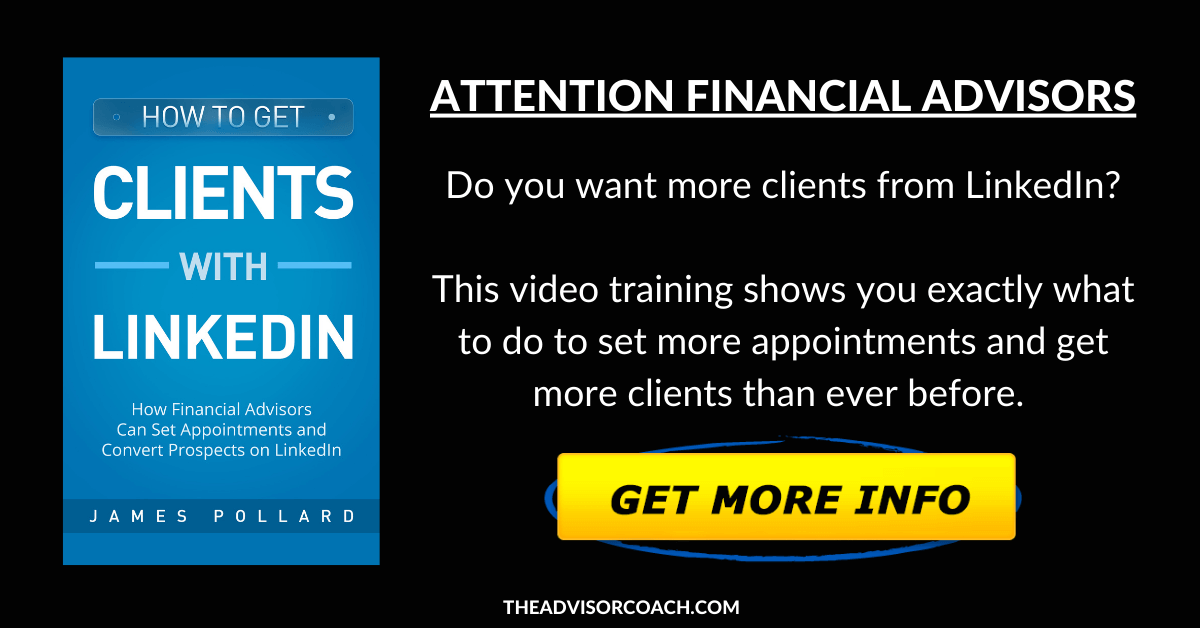7 Reasons Why Most Financial Advisor Sales Training Completely FailsHere’s something most financial advisors don’t want to hear…
A large part of a financial advisor’s job is to sell. Yes, the “S” word… SALES. I know… “sales” has a negative connotation, but here’s the thing… We’re all selling. Because financial advisors are selling in the same way that a doctor sells you on the idea of taking your medicine and improving your well-being. Financial advisors sell in the sense that parents sell their children on being healthy, safe, and responsible. Plus, sales is the backbone of business growth. Which means if you’re not good at sales or can’t learn quickly, you’re going to have a bad time. Because it doesn’t matter how good you are at giving financial advice. At the end of the day, if you can’t bring on new clients, you’re out of business. In fact, most training programs and offices require that you get a certain number of assets or clients in the first year or they fire you. If you can’t produce (aka “sell”) you can’t hang. However, sales is NOT a dirty word. It’s a learnable skill, which can help you become set for the rest of your life. Unfortunately, most financial advisor sales training completely fails. Here are the reasons we're going to cover:
1. They understate the importance of prospecting.Prospecting is arguably the most important thing a financial advisor can do, and it’s a subset of the “sales” skill.
It’s the first step in the sales process, which consists of identifying potential clients and engaging with them. Many financial advisor sales training programs I’ve seen focus on what happens after the financial advisor sets the appointment. Yet, none of that stuff matters until financial advisors can set appointments in the first place, and the way to book a calendar full of appointments is with consistent prospecting. I’ve seen more financial advisors fail for a lack of prospecting than perhaps any other reason. I’ve also found that many financial advisor sales training programs overcomplicate the prospecting process. They give a bunch of different tips, tactics, and strategies without focusing on what really matters, which is making contact with a prospect. I don’t care if you use direct mail, cold calling, social media, networking, or whatever - as long as you are consistently making contact with someone who has the potential to do business with you. AlSO READ: 15 Prospecting Tips for Financial Advisors 2. They talk about “branding”.Thinking you’re “branding” is the ultimate escape mechanism to avoid prospecting. The idea of building a brand and “getting your name out there” is one of the biggest cons ever sold to financial advisors.
Big marketing agencies perpetrate this lie too. I recently had a financial advisor reach out to me for private coaching, and he told me something that made me furious. He told me he hired a fancy marketing agency to handle his marketing and it wasn’t going as well as he thought it would. Want to know why? (Side note: NEVER fully outsource your marketing. It’s a huge mistake.) It’s because they told him to focus on “branding” and building “brand awareness”. I’m pretty sure smoke came out of my ears. I can’t stand when marketing agencies trick financial advisors into paying big bucks so they can raise “brand awareness”. It’s dumb. Yet, it happens all the time. I can’t deposit “awareness” in the bank. Do big companies like Disney and Coca-Cola focus on branding? They sure do - but they’re also playing a different game. Their game is to get their stock price up, impress shareholders, etc. and they’ve got billions of dollars to do it. Financial advisors are playing a different game. They have to acquire clients on a consistent basis for less money than they make from them. This is called “buying a client”. If it costs you $300 to acquire a client and you make $1,000 from that client, how many clients would you “buy”? As many as you possibly could! And to really hammer home how dumb this “branding” idea is, let me give you one more example… I want you to imagine two door-to-door sales reps selling identical products in identical neighborhoods to identical people. Let’s say that one sales rep drives around the neighborhood in his company car, which has his company logo and website address written all over it. Oh, and let’s say that he’s singing a song about how wonderful his company is. But he never asks for the sale and he never talks to anyone on a personal level. Now, let’s say that the other sales rep goes door-to-door and face-to-face telling his story and showing his products one house at a time. Here’s my question: if your life was on the line, and you HAD to pick which sales rep would make the most money… who would you choose? Enough said. Case in point - lately there's been a trend of financial advisors wanting to start their own podcast. Their argument is that a podcast is a good way to "build their brand". However, they fail to realize that leveraging other people's podcasts and resources would be a much better use of their time. You don't need to "build a brand". You need to reach your prospects. Of course, I can't talk much because I have my own podcast. :-) Although mine is specifically for financial advisors and I had a large audience before I recorded a single episode. 3. They rely on aggressive “closes” and put-ons.
Just for fun, I blew the dust off some of the old-school sales books and scripts I’ve got piled away at home. It amazes me that some people out there still use this stuff. But hey, I guess in the land of the blind, the one-eyed man is king. Here’s some of the stuff I saw…
Prospect: I’ll have to talk to my wife. You: If she’s anything like my wife, if she can’t eat it, wear it, or drive it, she doesn’t want to hear about it. WOW. (Yes, that’s apparently a script a company had in the 90s.) Try this one on for size… Prospect: I’m not interested. You: Okay, please, tell me what exactly you aren’t interested in. You could’ve won the Publisher’s Clearing House prize for all you know. Yikes. Prospect: I’m not interested. You: What is it about a pay raise you don’t like? I really have no idea how this stuff was ever taken seriously, but if you’re a financial advisor who is using anything like this, please do the world a favor and stop now. I’ve also seen this type of stuff spouted by so-called referral “experts”. For example, I recently saw an ad online for one of these “experts”. Out of curiosity, I clicked on the guy’s video. What I heard was a combination of aggressive put-ons and outdated sales tactics. You know, stuff that would make even the sleaziest used-car salesperson cringe. I felt physically ill because you don’t have to twist someone’s arm to get a referral. Yet, these referral “experts” continue to pile on the sludge. I can’t tell you how many times I’ve heard things like… “I get paid two ways!”... … “I need your help to grow my business!”... or how about this one… … “I’d like to you list three names on this sheet of paper. We’ll call them together!”. These ineffective approaches are based on the way people think clients SHOULD behave… in theory… but that’s not the reality of the industry today. The scariest part is that some financial advisors may be using these lines and having a trickle of success with them. However, they aren’t getting referrals because of those techniques… they’re getting referrals in spite of them. Just imagine how much more effective these advisors could be if they took all that natural ability and paired it with a more effective referral-getting process? 4. They encourage advisors to talk about solutions before knowing the problem.There’s an old saying…
“Prescription without diagnosis is malpractice.” Yet, that’s exactly what some financial advisor sales training encourages advisors to do. They talk about pushing products, services, and solutions first. As if people are somehow attracted to a product or service without knowing how it can help them. Selling financial services is known as “selling the invisible’ and without a tangible product for prospects to feel and experience, they have to be educated on how the product or service can solve a specific problem for them. For example, selling life insurance is easier than selling other financial services products because it is typically easy to understand and clearly solves a problem (i.e. peace of mind, protecting a family, etc.). However, selling something like financial planning is a little more abstract. Which means you must know the reasons WHY a prospect would be interested in financial planning and tailor your solutions to his/her problems. 5. They don’t help you identify a niche market.Now, I will admit that some financial advisor sales training programs are getting better at this. Some of the ones I’ve reviewed recently have added a section or two about niche marketing, so kudos to them.
Identifying a niche market is one of the biggest “quick wins” I can possibly give a financial advisor because it makes everything easier. It shortens the sales cycle and makes nearly all marketing campaigns more efficient. Why? Because instead of marketing to everyone, financial advisors serving a certain niche can refine their marketing messages to that niche. For example, a financial advisor serving the dentist niche can talk about dentists on his/her website, social media, direct mail pieces, and more. Plus, people are more likely to respond to a marketing message designed specifically for them. ALSO READ: 5 Best Niches for Financial Advisors 6. They talk about selling to different “personality styles”.
This is one of the kookiest things I’ve seen over my many years helping financial advisors. There’s a small part of the industry which believes that you must switch up your style depending on the prospect’s personality.
Now, this isn’t inherently bad advice. Different people DO have different personality styles and they SHOULD be treated accordingly. However, the biggest flaw with this type of thinking is assuming that the advisor should work with such a wide range of personality styles to begin with. In my experience, working with a wide variety of people leads to confusion and burnout. The business-building method I teach financial advisors is to dial in on a niche and work that niche. Plus, I’ve found that people within the same niche tend to have similar personality styles, so the problem solves itself. For example, a financial advisor who specializes in working with engineers will quickly find that engineers tend to have similar personalities. 7. They encourage too much talking and not enough listening.A lot of financial advisor sales training is chock-full of scripts, templates, and examples of WHAT to say or do. Some scripts are a good thing, especially as a guideline for the financial advisor to follow. However, this type of training gives the impression that the financial advisor should be the one doing most of the talking during a meeting.
Sales is NOT about talking. It’s about solving problems for people… and the most effective way to figure out someone’s problem (and therefore your solution) is to listen. The best financial advisors are superb listeners. They forget about the scripts and focus on the words and feelings their prospects convey in their language, tone of voice, facial expressions, and body language. Besides, financial services is a relationship business and relationships are built through active listening. One of the most common questions new financial advisors ask me is this: “I’m an introvert. Do you still think I can succeed as a financial advisor?” My answer? Yes, you can still succeed. You see, the financial services industry has a bit of an “extrovert bias”. Because lots of people think you need to be gregarious and extroverted to be a good financial advisor. Well, there are lots of successful extrovert advisors… and there are lots of successful introvert advisors. Neither one is good nor bad. Yet, there are a few traits which almost always make an advisor successful. One of those traits is the ability to listen, which introverts tend to have in abundance. I’ve found that listening is a lower drain on introverts’ social batteries than talking and engaging. Basically, listening is easier for them to do for long periods of time. They’d rather do it than tell stories about themselves. This is great because clients love to talk about themselves and financial advisors have to know a lot about their clients in order to put proper financial plans together. The Ideal Financial Advisor Sales Process
One of the best pieces of advice I can give a financial advisor when it comes to sales training is this…
“Don’t overcomplicate it.” There are tons of books, courses, and programs out there which try to make sales seem like a big, scary, intimidating thing. It’s not. All you’re doing is going out and helping people. Some people will want your help and others won’t. One thing I think all financial advisors should do is map out their entire sales process. It should look something like this: Leads → Prospects → Appointments → Clients What are you doing every step of the way? For example, what are you doing to find leads? Then, what are you doing to qualify them into prospects? Then, what are you doing to ensure your appointment goes well? ALSO READ: 9 Effective Appointment-Setting Techniques for Financial Advisors Finally, what are you doing to onboard your clients and deliver an amazing new client experience? ALSO READ: 15-Step Client Onboarding Checklist Once you map out your sales process and really think through it every step of the way, it should become easier for you. You’ll begin to view it as a series of steps, which you can continually optimize. Don’t let the process intimidate you and I wish you the best of luck in your sales journey! |





